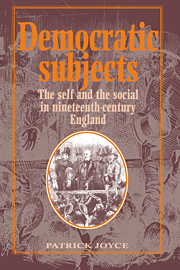Book contents
- Frontmatter
- Contents
- List of plates
- Acknowledgements
- Introduction
- Part One The sorrows of Edwin Waugh: a study in ‘working-class’ identity
- 1 Young Edwin
- 2 The struggle for the moral life
- 3 The ends of the moral life
- 4 The cult of the heart
- 5 ‘God bless these poor folks’
- 6 The legacy of Edwin Waugh
- Part Two John Bright and the English people: a study in ‘middle-class’ identity
- Part Three Democratic romances: narrative as collective identity in nineteenth-century England
- Appendices
- Index
3 - The ends of the moral life
Published online by Cambridge University Press: 10 December 2009
- Frontmatter
- Contents
- List of plates
- Acknowledgements
- Introduction
- Part One The sorrows of Edwin Waugh: a study in ‘working-class’ identity
- 1 Young Edwin
- 2 The struggle for the moral life
- 3 The ends of the moral life
- 4 The cult of the heart
- 5 ‘God bless these poor folks’
- 6 The legacy of Edwin Waugh
- Part Two John Bright and the English people: a study in ‘middle-class’ identity
- Part Three Democratic romances: narrative as collective identity in nineteenth-century England
- Appendices
- Index
Summary
The new situation Waugh found himself in after moving to the city was in very important measure dictated by his marriage to the illiterate Mary Ann. She is wanting ‘even the barest school education’ he reports. Only months after the marriage he is talking of ‘the ignorant girl who has been ruined by a mother more ignorant than herself’. Petted and waited on by this mother, there is no living with her in order and cleanliness. It is all ‘a miserably bad bargain’. Yet he defends her and her likes against the education à la mode of ‘misbred’ young ladies: she has the dignity that she can get her own living by her hands (as a sempstress) without much discomfort. And this ignorant girl, this bad bargain, is also ‘at once a pleasure, a revelation, a mystery and a misery’ to him.
By January he confesses to never having felt ‘so soiled a thing in my life … The day is eaten up with coarse cavils that make me disgusted and distrest for me and for her.’ She is ‘helpless’, ‘sluttish’, ‘miserable’, unable to wait on herself let alone a home. Mary Ann did not meet up with Edwin's expectations, expectations that seem to have been very much conventional for his time, whether with the poor or the upper classes: in 1849, when visiting the home of a seller of Chartist publications in Manchester, he notes how a ‘clean and tasteful’ home depends most of all on the wife.
- Type
- Chapter
- Information
- Democratic SubjectsThe Self and the Social in Nineteenth-Century England, pp. 49 - 55Publisher: Cambridge University PressPrint publication year: 1994



